- Home
- Peter Carey
Oscar and Lucinda bw-1988 Page 34
Oscar and Lucinda bw-1988 Read online
Page 34
Lucinda drew her whip along her gelding's flank and sped out of the vicarage, rattling the cattlegrid and leaving a cloud of talcum-fine clay dust for Mrs Judd to sweep off her veranda. She thought: I have made it worse. She thought: I will leave it alone. She made towards the ridge road through Darlinghurst, intending to visit the glassworks. She did not articulate this to herself, but her face, which had, through the agency of her tense upper lip, grown long, now softened and regained its more usual contours. The idea of this visit to the glassworks was a formless, nameless, anticipated pleasure, such as a tobacco addict has when coming out of church. It was the next thing. The next nice thing. But it was only a habit, and when she saw what it was she had been thinking she saw that the packet was empty. It was three weeks since she had promised Arthur Phelps-he who called his gut his bellows-that she would mot visit the works. How had she promised such a thing? Was she not the owner, after all?
Arthur had kept his broad hands busy with his tobacco and papers. His eyes had been absorbed by the business of licking and lighting, he had not looked at her, but she had looked ait him, at the great sweating girth encased in wet hessian bagging, at the male, foreign otherness of his white-haired skin. He had spoken to her-all the time
The Good Samaritan
fussing with a dainty cigarette he could have attended to blindfoldwith great politeness and discomfort. He had taken her out into the yard where the window glass was being packed into wooden crates. The wood was newly sawn and sweet and sappy in the spring air. Yellow straw was lifted by the nor'easter and hung like scratches in the sky. Arthur kicked at the dry rutted clay with his big blunt boots.
Lucinda waited for him. She saw he had a great sense of his own authority, a "natural" sense, far greater than that which would lead her to book a first-class cabin.
When he had finished fussing with his little cigarette he lit it within the sheltered cup of his hand.
"Mum," he said, "it is better if I am sent for and come to see you at your office." The timber mill next door screeched, a long shrill line of pain up the heart of a new cedar log. Arthur had gone to work there before. If he did not like it at the works he could, doubtless, find work at the mill again.
"You mean no harm, mum, I grant you. But it makes my boys be edgewise and standing on politeness, and then we see the gob-gatherer get the gob wrong and the second blower have his walls uneven and the item not worth taking further, mum. They are poor ignorant lads, and easily distracted by a lady."
This simple speech made her feel a despair too deep for tears, or even anger. Her mouth opened.
"If by chance you wish to visit," Arthur said, "then perhaps, mum, you let it be known aforehand."
"How long aforehand, Arthur?" She watched the glasspacker. He was using insufficient straw.
"Oh, just one day, mum, no more. You let it be known, and we will be ready for you, mum, and a proper inspection it would be, mum, like in Her Majesty's Navy, and not all rags and bags and odd socks either-all lined up and shipshape."
"But this is my business, Arthur." There was no edge to her voice-a voice that was often thought to be too easily icy or sarcastic. There was no will. Her eyes were dry and scratched like the straw-littered sky. "I am the proprietor."
And Arthur Phelps said: "I know, mum, but it be our craft, mum, you see. It be our craft." And she had accepted this. She had accepted because she could never forget the emptiness, the hollowness which had occupied the very centre of her being when she had returned from London and found the works empty, the furnaces cold, and that kitten-the murdering
Oscar and Lucinda
crunch of its skull was part of the same feeling-that loneliness, sickness, with nothing bright or soft or sympathetic. She knew she should not have accepted Arthur Phelps's demands. She was angry that she had. She now went to the works at night when the firemen were working, stoking the furnaces or, sometimes, putting in a new clay crucible. She made the firemen uneasy, too, but they had not the conceit or the craft, and dared not ask her to leave the wooden throne on which Arthur drank his pints and practised his trade. It was warm and dry in the works. She was there almost every night. She brooded. And now she would brood about Oscar Hopkins as well. The furnace doors would swing open silently and clang shut abruptly. The firemen's shovels would scrape along the floor. She would sit on Arthur's throne and drink brandy from a flask. She would think of homes, homes she did not have, homes she had lost.
She day-dreamed of letters to the bishop which she did not send, advertisements in the personal columns of the Sydney Morning Herald which she did not place. She went to Ah Moy's but did not see him. She attended Homebush and Randwick. She gambled as if there were a horse that might, by the churning force of its hooves amongst the mud, blot out the pain she felt. She bet fiercely. She did not see him anywhere; and when at last she did, in the post-office yard, she did not recognize him, not at first. The gap between her memory of him and the figure he had become produced a most unsettling feeling.
"Mr Hopkins?"
The man spun. He had a pimple on his top lip, although pimple is perhaps too polite a term for such a swollen infection whose surround was of a deep and angry red. He had a cut on his cheek and this also had the appearance of infection. When he saw who it was, he buttoned up his coat as if by doing this he would hide the way his gaunt neck poked out of his oversized secular collar.
"Miss Leplastrier," he said. He had no hat to lift. He produced a letter from his pocket and waved it in the air instead.
She also had a letter. It was to Mr Paxton asking details of some channelling he had designed to prevent condensation dripping from glass ceilings. She waved it.
They posted their letters. She tried not to watch Oscar count out his farthings to make up the price of the stamps. She saw the back of his hands marked with their praying stab wounds. She had never before in all her life been aware of causing so much harm. All the qualities which had before so irritated her, the nervous frailties, the boyishness, the innocence which she had
The Strattons'Wager
found so disturbing, now seemed to her to be very fine things indeed. Her carriage was in the yard at Druitt Street. She hailed a hansom and did not need to cajole him into it. Her manner was what Arthur Phelps would label "bossy." She had the cab drive to the boarding house in Bathurst Street.
Lucinda was appalled by this boarding house. She was so affronted by the condition of life, by the filth on the floor, the lampblack streaking up the walls, by the slovenly appearance of the owner that-when the propriety of her visiting Mr Hopkins's room was raised by this "creature" she struck his desk top with her umbrella. She did not look closely at what she found in Mr Hopkins's room, although a half-empty bottle of colonial hock stayed in her memory. He had a trunk. She had the cabby bring it down and they drove to Druitt Street and, having transferred both passenger and luggage to her own vehicle, drove out to Longnose Point.
She left Scandal behind her. She drove Scandal in front of her. She did not care. She drove all her emotions through a tight funnel. She had the maid bring her hot water and bandages. She laid towels on her dining-room table and laid his injured hands on top of them. She imagined him wounded from fighting with his fists. The wounds were red, surrounded by purple; they opened yellow, like lips of skin. They were, she thought, like flowers of flesh, like banksias. She cleaned the pus from his wounds. He made high hooting noises like a nigh third. 71
The Strattons' Wager
If the Reverend Mr Stratton had been a horse you would not have bet on him. He would have had sweat foaming on his flank where it was obvious, not hidden in the secret folds of his woollen combinations. But horse or no, the signs were there for anyone
Oscar and Lucinda
with an eye to see them: a certain wildness in the eye, an inclination to bolt out of the gate before his wife had closed the door. He stamped around beside the gate while she came along the path.
"There is plenty of time, dear Hugh," she said, hurr
ying, just the same, along the path, arranging a scarf around her facefor although it was only September there was a cold wind blowing off the sea.
"By what clock?"
"We only have one clock, Hugh. We have not had two clocks for eight years."
"Nine years," said Hugh Stratton, holding out his arm. "That was my point."
"Then I do not understand the basis of your question. Please explain it to me," she said in that humble, neutral tone of which she was, secretly, so proud. She knew this was perhaps a risky tone to take with Hugh in such a fractious and nervous state, but she could not, even if she had wished to, respond in any other way.
"The basis of my question," said Hugh Stratton, who would see that Theophilus Hopkins lay in wait for them a little further up the hill, "is that we have one clock, while Tommy Parsons has quite another."
It was Tommy Parsons who drove a pony trap along the high road each day sometime between eight o'clock and nine o'clock. It was Tommy Parsons Mr Stratton was reliant on if he were to get to the races today at Newton Abbot.
'Tommy Parsons," said Mrs Stratton, "has, in all likelihood, no clock at all. I would be most surprised, Hugh, wouldn't you, to see Tommy Parsons with a clock." Hugh Stratton sighed bad-temperedly. "My point," he said, "my point, dear Betty, is that the little Methodist will not have a clock. He will have no idea of time at all. He could be cantering along the high road at this moment while we are here arguing about the time and, lookee, the Evangelical awaits us. He will make us later."
And indeed, Theophilus was now walking down his short path with his notebook in his hand. He pretended that he had not seen the Strattons at all and, so set was he on this deception, that he let them walk right through his gaze before he "saw" them.
"Ho," he said.
The Stations' Wager
"Ho," said Mr Stratton, but in a way that made Mrs Stratton give his arm a cautionary squeeze.
"Do you have news?"
"The mails have been bad," said Mrs Stratton. "It has taken two weeks for us to get our papers up from Oxford. I can't think what is causing it."
"Ah, yes," said Theophilus and, without attempting more conversation, stood there, looking at them both, nodding his head. He had a little lump of porridge in the corner of his mouth. It made him look neglected.
"And how is your health, Mr Hopkins?" asked Mrs Stratton.
"You must excuse us," said Mr Stratton.
"It is not yet eight," said Mrs Stratton who was always embarrassed by these meetings with Theophilus and, just because she would like to rush away, felt she must prolong them.
"Then go," said Theophilus in a loud voice which brought Mrs Williams's wild grey head to the window. "I do not seek to detain you."
"That is true," said Betty Stratton. "It is I who seek to detain you, whilst my husband takes the opposite position."
"Oh, help me," said Hugh Stratton.
Theophilus looked at Hugh Stratton as he always looked at him, as if he were a variety of beetle that God, in his infinite ineffable wisdom, had placed upon the earth. He saw the yellowed eyes, the livid skin, the deep creases like knife cuts beside his mouth. He saw the fury in his eyes and imagined it was because he had lost one more member of his congregation to the Plymouth Brethren. The Great Wolf himself must show just such a yellow-eyed rage when a lamb is placed safe inside the fold.
"You must excuse me," said Hugh Stratton, doffing his hat, "but my contrary position in the argument must place me on the highway." And, with a twisted smile which was not intended to be unfriendly but, given the turbulent state of his emotions, was all he could manage, he set off up the path and left his wife and Theophilus Hopkins in the tangled skeins of their mutual embarrassment.
Hugh Stratton carried one hundred and twenty-one pounds and sixteen shillings. The six shillings jingled in his trouser pocket. The soft leafy currency lay fat and soft and silent next to his heart. This was the sum of his wife's capital, the interest from which had hitherto allowed them some softening of their harsh
Oscar and Lucinda
position. It had paid for Mrs Stratton's periodicals, Mr Stratton's trips to Oxford, and a bottle of sherry once a week. Today he would apply this sum to the system supplied to him by young Master Hopkins.
Hugh Stratton was much impressed by what the system could provide, and never more so than when he had seen his protégé ensconced in luxury aboard the Leviathan. The image of those gold-leafed ornate columns had stayed a long time in his mind. And yet he was the wrong person to be setting off up the hill on his way to deal with bookmakers. He did not have the personality to control the system. His wife was thorough, dogged, calm, all those qualities she made clear to the world by her style of walking. Hugh Stratton on the other hand-everyone at Oxford had said so-had brilliant insights but never the patience to be a distinguished scholar, was always in too much of a hurry for a result, an effect, the reassurance that all his work was not being wasted on a fallacy.
Having decided that they would wager the whole of their financial foundation, Betty Stratton was quite capable of going round the racetracks in the proper manner, taking her time, slowly observing and collecting the information they would need to make Oscar's system work effectively, but Hugh-who felt he must control it-was too fearful to work properly. He made scrawling notes and could not read his writing. He watched a race and somehow saw nothing. He talked to a jockey but, so keen was he to appear expert, he would not ask an explanation of terms he did not understand.
And yet here he was on the way to the racecourse where he would throw their fortune into the maws of the bookmakers' bags. He believed the evening would see them wealthy, and yet he did not believe it sufficiently, and while the front of his expectations was bright and freshly painted, with red plush and fluted columns, there lurked, far beneath all this, like the memory of a dream involving rotting teeth, the knowledge that his preparation was inadequate. He could not bring himself to look at what was wrong. He must rush forward. He must not miss the pony trap. And if you saw his sweating lip, the angry stare in his eye, you would know that this was a man who had already decided to ruin himself and that only his wife, hurrying behind, with her body severely inclined from the vertical, still imagined that they might at last improve the financial conditions of their lives.
72
Mrs Smith
Lucinda had a maid, a Mrs Smith, a childless widow just turned thirty. She was not lively or talkative, but these qualities which Lucinda had once thought essential now seemed-after ten maids had come and gone inside twelve months-no longer so.
Mrs Smith was good at her job. She was small and thin, but you would not call her slight, for her limbs were strong like an athlete's and she liked to scrub, and beat, and sweep. She did this work silently, as if holding her breath. When she spoke, her eyes remained quite unengaged and the only thing that seemed to put them into gear was church. She was a Baptist. She did not find the house too lonely, although this had been a common complaint with her predecessors. She did not wish to go dancing at Manly or walking in the Domain. She wished only to have every sabbath to do what she described as her "Christian Duty" and she declared this so fiercely and belligerently that Lucinda imagined that Mrs Smith's religion was a jewel-bright and private room where an Anglican's presence would not be welcome.
The normal terms were fifteen shillings a week and every other Sunday afternoon and evening off, and one free night a week. But Lucinda did not try to bargain. She offered Mrs Smith sixteen shillings a week and agreed to her terms. Mrs Smith said she would give the extra shilling to the Lord.
The arrangement was not cheerful but it was practical. The silver was properly cleaned and there was none of that bitter tasting crust on the fork tines that had so distinguished the tenure of the ninth maid.
The bathroom smelt of bright and pungent patent formulae. Waves of ammonia seemed to emanate from the waterside windows which were always, no matter what the weather, sparkling clean. And if the house became slight
ly hostile and chemical by day, this was conquered in the night by the rich aromas of the stews which were Mrs Smith's great skill. The stews were a surprise. There is something wild and
Oscar and Lucinda
generous abut the better stews. They are best put together on the winds of impulse, guided by the compass of intuition. These were all qualities that Mrs Smith would have appeared to lack. You would expect something thin and watery from her pot. There was no indication that this was a woman who threw her herbs in by the stalkful, cut her meat big and would know whether the fungus she found on the borders of Whitefield's paddocks could be eaten even if it were a poisonouslooking yellow and shaped like a lady's fan.
When Oscar Hopkins was brought into the house, Mrs Smith, similarly, showed herself to be not mean as her mouth suggested but both compassionate and practical. It did not occur to her to question the propriety of introducing a man into a house occupied by single women. She saw nothing untoward with him being attended to on the diningroom table. She fetched towels from the linen press and she got good thick ones lest the heat from the water she had been asked to boil should damage the French polishing.
Of course, she did not know who Oscar Hopkins was. She did not know he was a scandal. She saw his hands and, having more experience of the agonies of prayer than her mistress, recognized those half-moon-shaped infections. She tore up a cotton chemise-really still too good to throw away, but of the right softness and texture for cleaning wounds-and then she stood back, her arms folded, her head on one side, her eyes apparently as neutral of expression as a bird's and watched her mistress tend to the man.
She did not say anything in front of the man, but her face softened a fraction as she fitted her bigfingered hands together, rocking one hand back and forth on the tines of the other. In the kitchen she whispered to Lucinda: "Them cuts was made by praying," And she demonstrated how this might be done, shutting her eyes while doing so. Lucinda was repulsed and excited by this fervent prayerfulness. It seemed alien, popish, like Italian paintings of the torture of saints. She felt judged by it. She respected it, perhaps excessively, she who thought the kneelers at Balmain not soft enough. She found the iodine behind the cochineal where Prucilla Twopenny had hidden it.

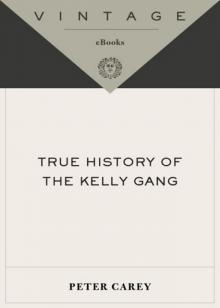 True History of the Kelly Gang
True History of the Kelly Gang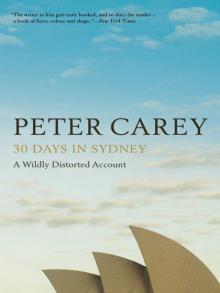 30 Days in Sydney: A Wildly Distorted Account
30 Days in Sydney: A Wildly Distorted Account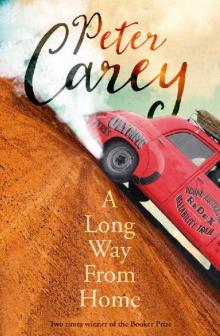 A Long Way From Home
A Long Way From Home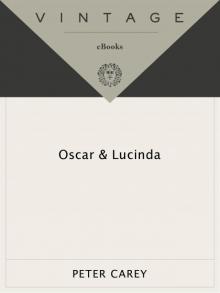 Oscar and Lucinda
Oscar and Lucinda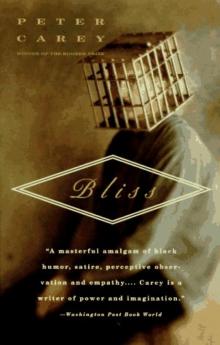 Bliss
Bliss Wrong About Japan
Wrong About Japan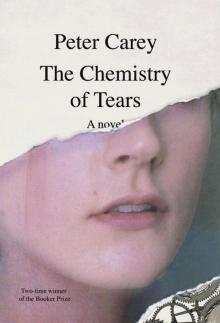 The Chemistry of Tears
The Chemistry of Tears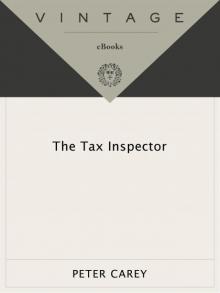 The Tax Inspector
The Tax Inspector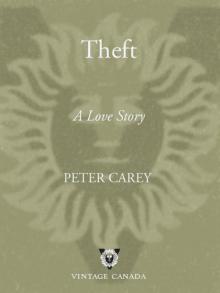 Theft: A Love Story
Theft: A Love Story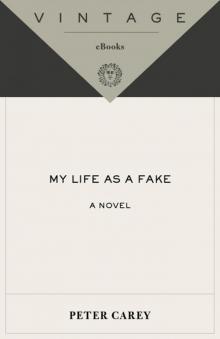 My Life as a Fake
My Life as a Fake Collected Stories
Collected Stories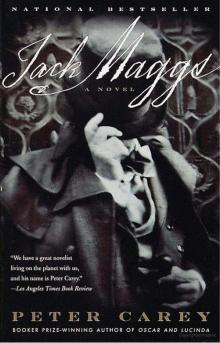 Jack Maggs
Jack Maggs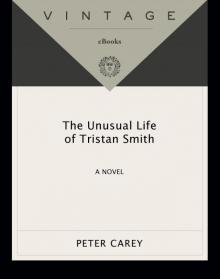 The Unusual Life of Tristan Smith
The Unusual Life of Tristan Smith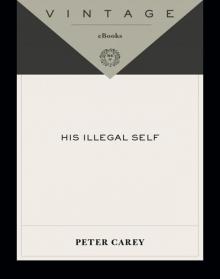 His Illegal Self His Illegal Self His Illegal Self
His Illegal Self His Illegal Self His Illegal Self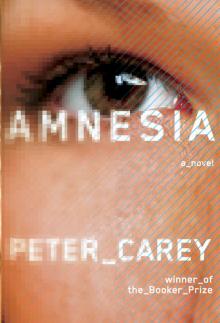 Amnesia: A Novel
Amnesia: A Novel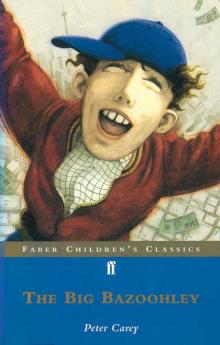 The Big Bazoohley
The Big Bazoohley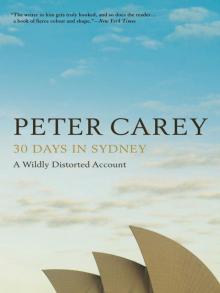 30 Days in Sydney
30 Days in Sydney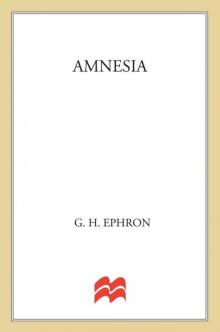 Amnesia
Amnesia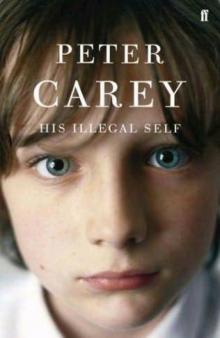 His Illegal Self
His Illegal Self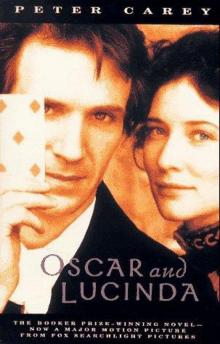 Oscar and Lucinda bw-1988
Oscar and Lucinda bw-1988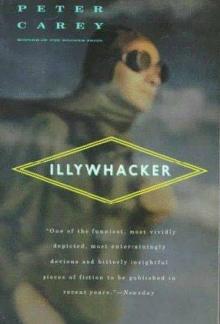 Illywhacker
Illywhacker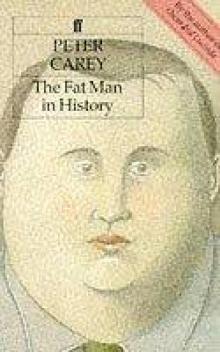 The Fat Man in History aka Exotic Pleasures
The Fat Man in History aka Exotic Pleasures